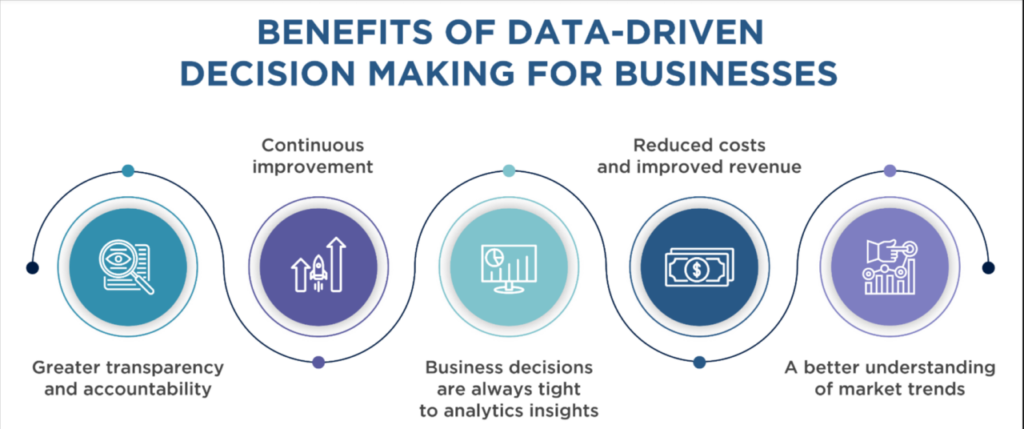In today’s highly competitive business environment, data-driven decision-making has become essential for organizations aiming to enhance their customer relationships and drive growth. Advanced Customer Relationship Management (CRM) analytics play a pivotal role in this process by providing deep insights into customer behavior, preferences, and trends. This article explores the significance of data-driven decision-making and the transformative impact of advanced CRM analytics on business strategies.
Understanding Data-Driven Decision Making
Data-driven decision-making refers to the practice of basing decisions on the analysis of data rather than intuition or observation alone. This approach allows businesses to make more accurate, objective, and reliable decisions by leveraging quantitative data and statistical analysis. The benefits of data-driven decision-making include improved efficiency, reduced risk, enhanced customer satisfaction, and increased profitability.
CRM systems are designed to manage and analyze customer interactions and data throughout the customer lifecycle. They compile data from various touchpoints, including sales, marketing, customer service, and social media, providing a comprehensive view of each customer. Advanced CRM analytics go beyond basic data aggregation to offer predictive and prescriptive insights, enabling businesses to anticipate customer needs and behaviors.

Key Components of Advanced CRM Analytics
- Predictive Analytics: This involves using historical data to predict future customer behavior. Techniques such as machine learning algorithms and statistical models help identify patterns and trends, allowing businesses to forecast sales, customer churn, and product demand.
- Prescriptive Analytics: This provides recommendations on the best actions to take based on predictive analytics. By analyzing various scenarios and outcomes, prescriptive analytics helps businesses optimize their strategies for marketing campaigns, sales tactics, and customer service enhancements.
- Customer Segmentation: Advanced CRM analytics enable precise customer segmentation by grouping customers based on similar characteristics and behaviors. This allows for targeted marketing and personalized communication, improving customer engagement and loyalty.
- Sentiment Analysis: By analyzing customer feedback from surveys, reviews, and social media, sentiment analysis helps businesses understand customer sentiments and perceptions. This information is crucial for improving products, services, and overall customer experience.
- Churn Analysis: Identifying customers who are likely to churn is critical for retention strategies. CRM analytics can pinpoint risk factors and trigger proactive measures to retain valuable customers, such as personalized offers or improved customer support.
Benefits of Advanced CRM Analytics
- Enhanced Customer Understanding: With detailed insights into customer behavior and preferences, businesses can tailor their offerings to meet specific needs, resulting in higher customer satisfaction and loyalty.
- Improved Marketing Effectiveness: Targeted marketing campaigns based on accurate customer segmentation and predictive insights ensure that marketing efforts are more relevant and effective, leading to higher conversion rates.
- Optimized Sales Strategies: Sales teams can focus on high-potential leads and opportunities, improving sales efficiency and closing rates. Predictive analytics also helps in identifying upselling and cross-selling opportunities.
- Proactive Customer Service: By anticipating customer issues and addressing them proactively, businesses can enhance customer support and reduce churn. Sentiment analysis further aids in identifying areas for improvement in customer service.
- Informed Strategic Decisions: Data-driven insights support strategic decision-making across the organization, from product development to market expansion. This reduces uncertainty and helps in aligning business strategies with customer needs and market trends.
Implementing Advanced CRM Analytics
To leverage advanced CRM analytics effectively, businesses should:
- Integrate Data Sources: Ensure that data from various customer touchpoints is integrated into the CRM system for a unified view of the customer.
- Invest in Analytics Tools: Utilize advanced analytics tools and platforms that offer capabilities like machine learning, artificial intelligence, and big data analytics.
- Train Staff: Equip employees with the necessary skills to interpret and act on analytics insights. This includes training in data literacy and the use of analytics tools.
- Continuously Monitor and Improve: Regularly review analytics outputs and refine models and strategies based on new data and evolving business needs.
Advanced CRM analytics are a cornerstone of data-driven decision-making, empowering businesses to make informed choices that drive growth and enhance customer relationships. By harnessing the power of predictive and prescriptive analytics, customer segmentation, and sentiment analysis, organizations can gain a competitive edge in the marketplace. As the business landscape continues to evolve, investing in advanced CRM analytics will be crucial for sustained success and customer-centric innovation.